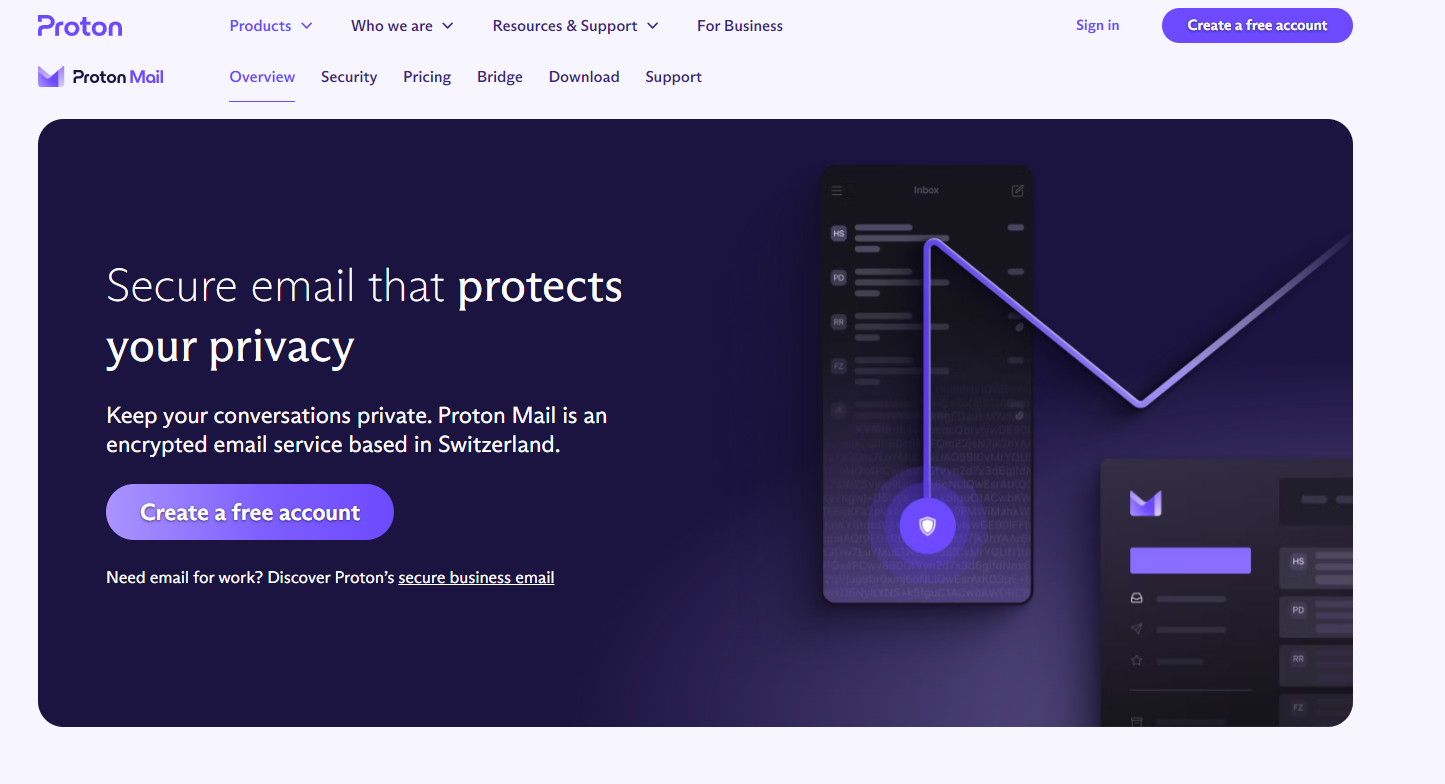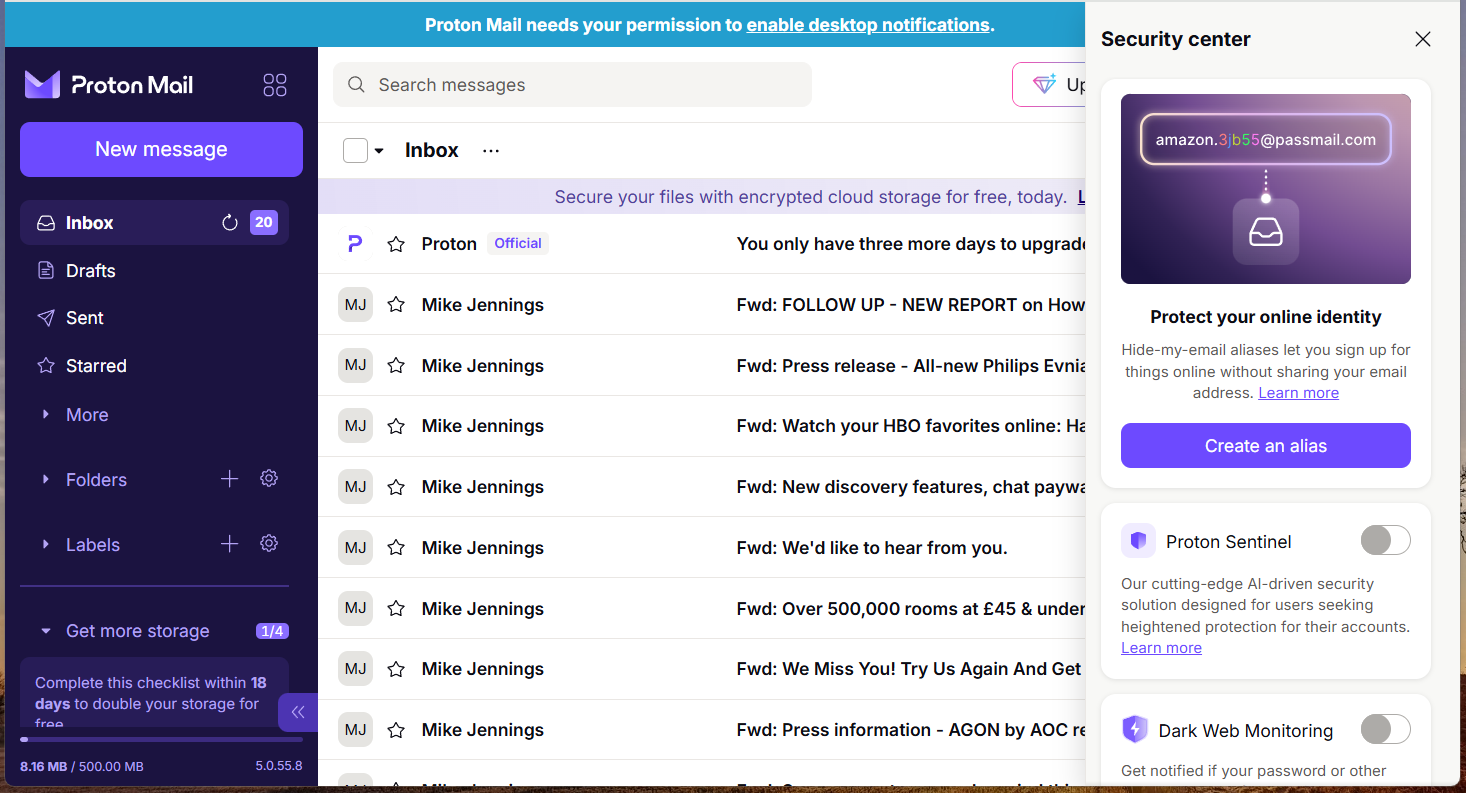TechRadar Verdict
A robust and secure service with features beyond email
Pros
- +
Great encryption and interface
- +
VPN, password manager and other features
- +
Broad tiers and customer support
Cons
- -
Subject lines aren’t encrypted
- -
Pricier than some rivals
Why you can trust TechRadar
It’s always tempting to grab a free account if you need an email address, but if you do that then you’re opening yourself up to advertising, security risks and having your data sold – because if it’s a free service, then it’s likely that you’re the product.
If that’s a concern, a secure email provider like Proton is the answer. It’s one of the most well-known secure email providers, and it’s been around for over a decade – the Swiss company was founded in 2013 and remains based in Switzerland.
Its security credentials are immediately impressive: it uses end-to-end encryption for email content, so your emails are encrypted before they get sent to Proton’s servers. That’s an immediate leg up on most providers.
Proton Mail: Plans and pricing
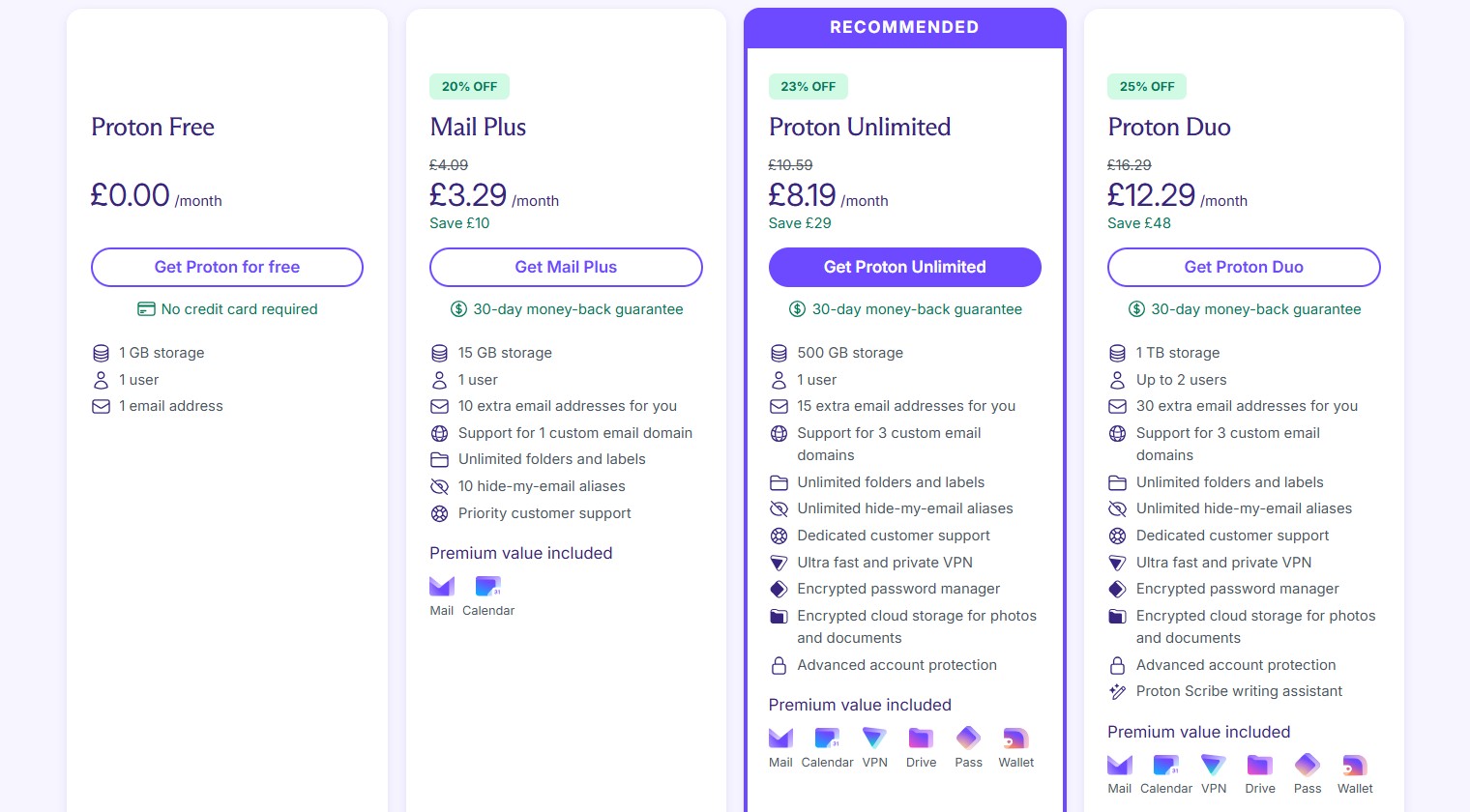
You can actually use Proton Mail with a free account. You benefit from Proton’s end-to-end encryption at that level, although you only get one email address and 1GB of storage.
Mail Plus costs $3.99/£3.29 per month and provides individuals with ten aliases, support for one custom domain, ten hidden addresses and 15GB storage, and the $9.99/£8.19 Proton Unlimited plan delivers a whopping 500GB storage, more custom domain support and extra features, like access to Proton’s VPN, cloud storage and password manager.
Then there’s the Proton Duo account, which costs £14.99/£12.29 for two users and adds all the previous functionality alongside the Proton Scribe writing assistant.
A family account for $23.99/£18.44 per month allows up to six users and 3TB of storage.
Sign up to the TechRadar Pro newsletter to get all the top news, opinion, features and guidance your business needs to succeed!
Businesses can sign up for Essentials, Professional and Business Suite accounts, which cost $6.99/£6.99, $9.99/£9.99 or $12.99/£12.99 per month and add progressive levels of functionality in line with those individual packages.
You can pay with cryptocurrency when signing up for Proton Mail, which is a service not offered by every competitor.
Proton Mail: Features
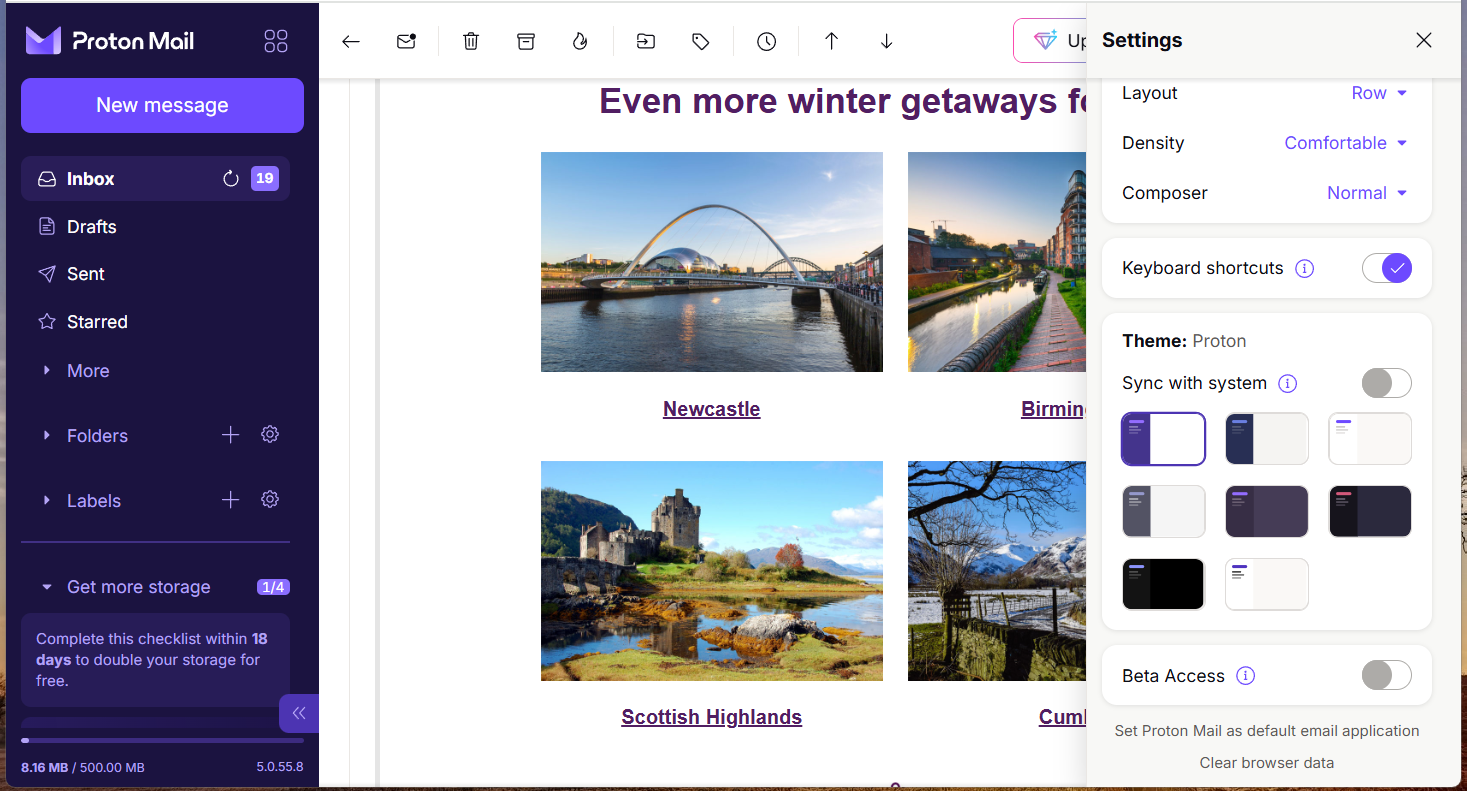
Proton Mail is not the cheapest secure email provider, but it’s packed with functionality. End-to-end email encryption between Proton users is a great starting point – it means no third party and even Proton Mail can’t access the content of your emails.
If you’re sending emails to non-Proton users, you can select the password-protection option to deploy end-to-end encryption, and TLS is used for emails elsewhere – that’s robust, but be aware that other providers will be able to read those messages if they’re asked to do so by legal agencies.
If you receive emails from non-Proton users, they’re encrypted using TLS and then re-encrypted using zero-access encryption for storage on Proton’s services. Indeed, all messages in your Proton inbox are stored using zero-access encryption, so Proton can never access the data.
Elsewhere, emails can be deleted automatically with expiry rules, and Proton can block spy pixels and tracking links hidden in images.
There’s one sting in the tail here: Proton’s reliance on TLS and OpenPGP means that subject lines are not protected by the same level of end-to-end encryption as message contents.
Nevertheless, that’s a good starting point, and Proton continues to impress. Most levels of Proton subscription include access to the ProtonDrive cloud storage system, which benefits from the same strong encryption as the email system. It’s also got extensive version history storage and a rudimentary document editor.
And because Proton has a much broader offering than just email, you get access to ProtonVPN, too, which delivers private browsing alongside secure email.
Elsewhere, every tier includes access to the ProtonCalendar module, which allows users to build different calendars for different purposes, and some tiers include a password manager, too.
It might not have the word processing, spreadsheet or video conferencing features of a rival like Mailbox.org, but Proton’s VPN is a welcome addition. Its cloud storage, password manager and calendar make it an excellent, secure organizational tool.
And that’s not all: it’s got Android and iOS apps for virtually every module, too, including its email package, and you can use the SimpleLogin browser extension to use anonymous email addresses whenever you sign up for online services – ideal if you don’t want to reveal your real email address.
There aren’t many significant issues here. As with Mailbox.org, most of Proton is open source, including its web client, encryption, and apps, but you may want to look elsewhere if you want an entirely open-source provider.
The search function could be better, and the sign-up verification system could be more secure – you’ll need to have a verification code sent to a phone number or email address, and sometimes you may need to provide more authentication than that.
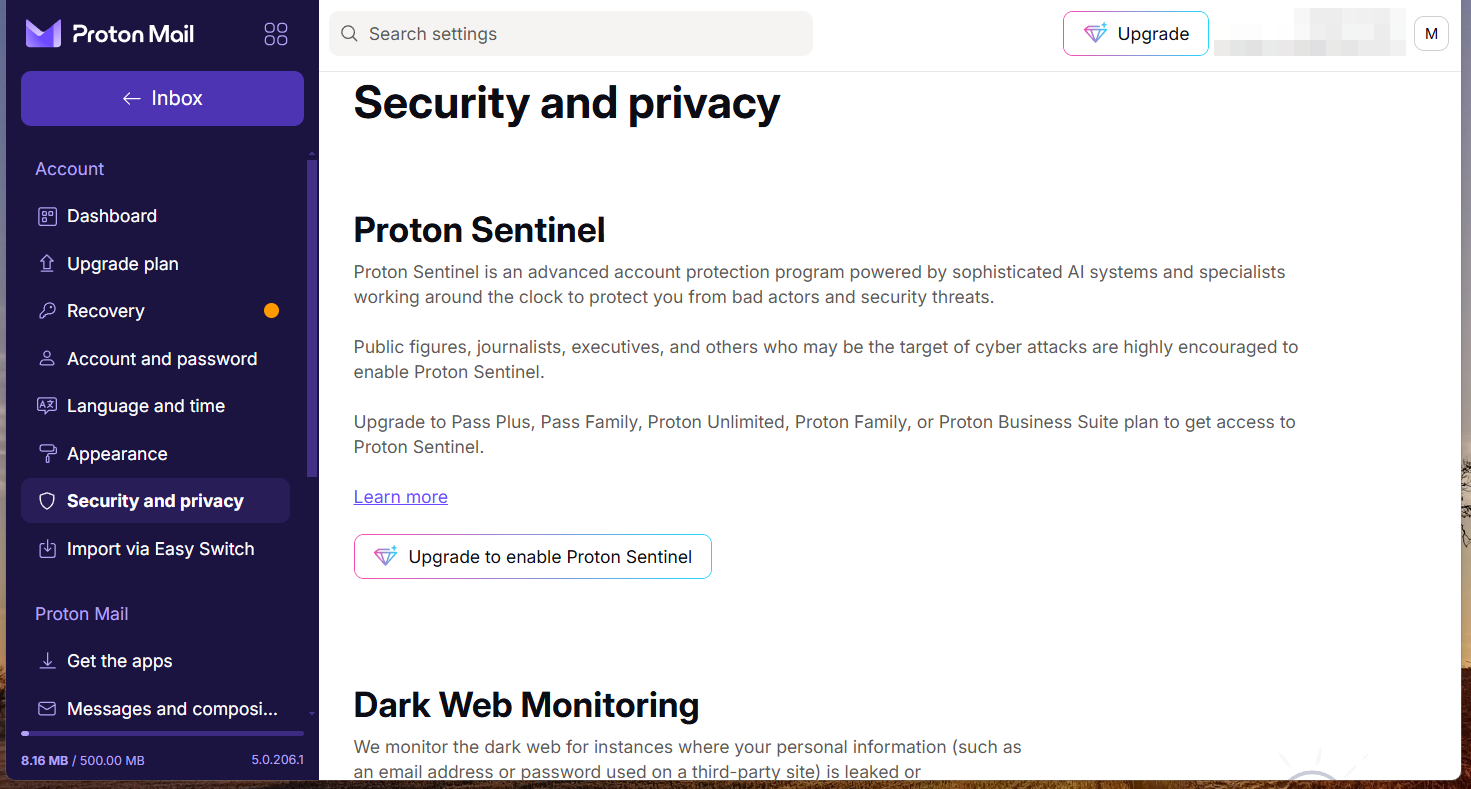
Proton Mail: Interface and in use
There’s plenty to like about Proton’s design, too. It’s a classic two-pane system, with folders on the left and emails on the right, and you can click a button at the top of the window to open other modules. You can switch to a traditional three-pane interface if that’s preferable, choose different content density levels, and even pick different visual themes if you’d prefer a different look.
As well as desktop and mobile browser access and its Android and iOS apps, Proton also offers a downloadable desktop client that allows you to access Proton Mail from an existing app, like Microsoft Outlook or Apple Mail.
Proton Mail: Support
Customers on every plan other than the free account get higher-priority support, and live chat, phone support and conventional tickets are all available alongside knowledge base articles and FAQs.
Business plans get priority support, too, and guaranteed 99.95% uptime thanks to Proton’s SLA. Additionally, the service is compliant with GDPR in Europe and HIPAA in the US, with the latter particularly useful for the healthcare industry.
Proton Mail: The competition
Proton’s range of features sees it stand beyond most secure email providers and stand apart from its key rival, Mailbox.org.
Positively, Proton has that free account option, and it goes beyond Mailbox.org with its VPN and password manager. But Mailbox.org is slightly cheaper and includes a fully featured word processor, a spreadsheet app and video conferencing.
Tuta, meanwhile, uses its own end-to-end encryption standards and is more affordable than Proton, so it’s worth considering if you want to save money.
Similarly, Hushmail is also cheaper, even if it doesn’t come with many extra features.
Proton Mail: Final verdict
Proton Mail is one of the best secure email products available, with robust encryption that’s backed up by several legal victories and a robust Swiss business.
Beyond secure email, it also impresses with its VPN, password management and cloud storage modules. It’s not the cheapest, but if you want secure email with extras, Proton is one of the best options.
We've featured the best email hosting services.
Mike has worked as a technology journalist for more than a decade and has written for most of the UK’s big technology titles alongside numerous global outlets. He loves PCs, laptops and any new hardware, and covers everything from the latest business trends to high-end gaming gear.
You must confirm your public display name before commenting
Please logout and then login again, you will then be prompted to enter your display name.
